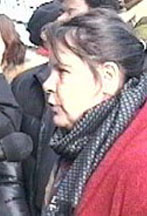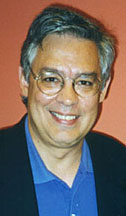|
Pacifica settles suits Originally published in Current,
Dec. 17, 2001 The Pacifica Foundation settled four lawsuits against it Dec. 12 [2001] by agreeing to restore listener representatives to its board, a move likely to give progressive activists control of the left-wing radio network. The settlement calls for the foundation's board to resign and appoint reps to a new interim board that will revise Pacifica's bylaws and clear the way for a permanent board to take over in 15 months. The interim board could be formed as early as this week. Local Advisory Boards (LABs) based at Pacifica's five stations will each appoint one member to the new interim board. Members of LABs come from each station's listening area and advise the station on behalf of its audience. The return of LAB members reverses a controversial 1999 decision in which the board made itself self-selecting, drawing accusations that it broke Pacifica's bylaws and made the historically grassroots network unaccountable to listeners. LABs, listeners and dissident board members all sued Pacifica to negate the decision. Those suits are now history. Ten other board members--five appointed by the current board majority and five appointed by dissidents--will join the LAB reps on the interim board. With that balance, activists expect to gain control. However, they were forced to compromise and saddle the interim board with a complex decision-making process that aims to give equal standing to the majority, dissident and LAB factions. For the interim board to pass a resolution, it will need either a two-thirds vote or a majority vote that includes at least one vote from each camp. If a resolution has majority support but lacks votes from all factions, it can be taken to Alameda County Superior Court Judge Ronald Sabraw, who oversaw the lawsuits and settlement. Plaintiffs in the lawsuits expect Sabraw to rule along with the interim board majority of dissidents and LAB representatives, guaranteeing them the upper hand. The current board majority wanted veto power, said Carol Spooner, lead litigant in the "listeners' lawsuit." "But we couldn't give it to them, so we crafted a way to override their veto," she said. The interim board has a lot of work ahead, including a list of "hot issues" that it will be empowered to address. But board member Leslie Cagan has hope. "With the changes that are going to begin to be implemented immediately, we feel that we have turned a big corner and can begin to rebuild this foundation," she said. One of the interim board's first tasks will be to clean up Pacifica's finances. As of last month, the network owed more than $2 million and had just $300,000 in the bank. (Defendants will help alleviate the debt when their insurance company pays the Foundation $400,000, as the settlement demands.) The interim board is also eager to return Pacifica's flagship morning show, Democracy Now!, to the air. The show staff has produced at a remote location since August, but Pacifica has refused to distribute it. Cagan said she planned to talk with host Amy Goodman to agree on terms for the show's return to the air. "We're hopeful that enough details can be worked out to get it back on the air quickly," Cagan said. Pacifica's board first resolved to resign en masse a month ago, but in the following weeks got bogged down in negotiations. Last week, board members resolved their differences in a routine settlement conference required by the Alameda County court, where the lawsuits were slated for trial Jan. 7. The landmark shift in power has cheered Pacifica's critics, many of whom have fought the network every step of the way for the past two years. Immediately after settling the lawsuits, Spooner, Cagan and other plaintiffs interrupted programming on KPFA, Pacifica's Berkeley station, to share their good news with listeners. With the war over, activists and dissidents expect to cool their rhetoric and begin a new phase of planning Pacifica's future with help from LABs and listeners. "I'm feeling almost serene," Spooner said, adding, "There are huge amounts of work that need to be done. It's going to require pulling together many people who have not understood each other well to begin listening and hearing and, maybe, forgiving some things so we can move on. Pacifica has a job to do." "I believe this agreement thrusts our movement into a new stage," said Juan Gonzales, whose Pacifica Campaign led boycotts and pickets to unseat the board majority. "We must mobilize maximum support for the new board majority so that it can fashion a genuinely democratic structure for Pacifica." Gonzales also urged activists to end the boycott and once again give money to Pacifica. There are already signs that will happen. "I haven't given in three years, and I'm writing my check tonight," said KPFA producer and reporter Noelle Hanrahan on a Dec. 12 broadcast of the public affairs show Flashpoints. In an auspicious end to his statement, Gonzales wrote, "Hope to see you soon on another edition of Democracy Now!" He resigned as co-host of the program and started the boycott campaign earlier this year. "I have to get used to not calling myself a dissident, and calling myself part of the board majority now," Cagan said, laughing. Cagan and fellow dissidents Tomas Moran, Pete Bramson and Rob Robinson will serve on the interim board. Dissident Aaron Kriegel has not decided if he will join them. Defendants have not announced their appointees, but current chair Robert Farrell will not return. Three LABs have already appointed reps. Berkeley's KPFA appointed Spooner, and KPFK in Los Angeles appointed Dave Fertig. WPFW in Washington, D.C., elected Jabari Zakiya. As part of the settlement, the new interim board will create a system-wide process for electing new LABs in a year. Last month the board suggesting modeling it after a system developed at KPFA, which gives one vote to each of its donors. In another development, Utrice Leid, Pacifica's national program director, resigned last week. Leid stirred controversy as g.m. of WBAI, Pacifica's New York station, the position she held before moving to the national office. Pacifica management installed her as g.m. after firing WBAI's previous manager and program director a year ago and changing locks on the station's doors in what is now known as the "Christmas coup." |
Persistent pressure from lawsuits and demonstrations combined to force the board's resignation. Pictured: Carol Spooner, a lead plaintiff, and Juan Gonzales, a campaign leader. (Spooner photo: Frank Fitzgerald.) |



